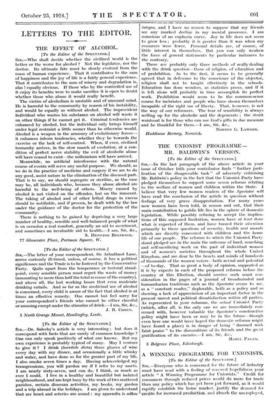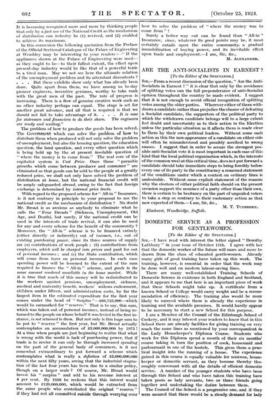A WINNING PROGRAMME FOR UNIONISTS.
[To the Editor of the SPECTATOR.] SIR,—Everyone who is concerned for the future of industry must have read with a feeling of renewed hopefulnns your article "A Winning Programme for Unionists." Credit for consumers through reduced prices would do more for trade than any policy which has yet been put forward, as it would rapidly establish the home market, justify the demand for credits for increased production. and absorb the unemployed, It is becoming recognized more and more by thinking people that only by a just use of the National Credit as the mechanism of distribution can industry be (1) revived, and (2) enabled to achieve its maximum.
In this connexion the following quotation from the Preface of the Official Sectional Catalogue of the Palace -of Engineering at Wembley may be interesting to your readers :—" If the appliances shown at the Palace of Engineering were used— as they ought to be—to their fullest extent, the effect upon present-day industry would be like that of a powerful tonic to a tired man. May we not see here the ultimate solution of the unemployment problem and its attendant discontents? . . . But these exhibits show only what has already been done. Quite apart from them, we have among us to-day pioneer engineers, inventive geniuses, worthy to take rank with the great men of the past. The rate of progress is increasing. There is a flow, of genuine creative work such as no other industry perhaps can equal. The stage is set for another great advance, and all that is required is that we should not fail, to take advantage of it. . . . It is now for statesmen and financiers to do their share.. The engineers are ready and waiting."
The problem of how to produce the goods has been solved.
The Government which can solve the- problem of how to distribute them when produced will not only solve the problem of unemployment, but also the housing question, the education question; the land question, and every other question which is being held up by the at present insoluble question of "where the money is to come from." The real core of the capitalist system is Cost Price. Once those "parasitic growths which come- between producer and consumer" are- eliminated so that goods can basold to the-people at a greatly reduced price, we shall not only have solved the problem of distribution at home, but the national financial credit will be amply safeguarded abroad, owing to the fact that foreign exchange is determined by internal price levels.
With regard to the proposed scheme for-" AH-in "Insurance, is it not contrary in principle to your proposal to use the. national credit as the mechanism of distribution ?' No doubt: Mr. Broad is as anxious as anybody to eliminate what he calls the "Four Dreads" (Sicknes* Unemployment, Old: Age, and Death), but surely, if the national credit can be used in the interests of trade revival, it can also be used for any and every scheme for the benefit of the community ? Moreover, the " All-in " scheme is to be fmaneed entirely (either directly or indirectly) out of incomes, i.e., out of existing purchasing power, since its three sources of supply are (a) contributions of work people ; (b) contributions from employers, which will be charged into prices and paid for out of personal incomes ; and (c) the State contribution, which will come from taxes on personal incomes. In each case spending power will be lessened to the extent of the sum required to finance the " All-in " scheme, and goods to the same amount rendered unsellable in the home market. While it is true that much of this money will be redistributed to the workers against pensions, unemployment, sickness, medical and maternity benefit, workers' widows endowment, children under fifteen, and administration costs, by far the largest item in the estimated expenditure for the first year comes under the head of "Surplus "--£66,725,000—which would be earmarked for "reserve." That is to say, this sum, which was taken out of personal incomes, instead of being re- turned to the people on whose behalf it was levied in the first in- stance, is not returned to them. But not only is this huge sum to be put to " reserve " the first year, but Mr. Broad actually contemplates an accumulation of 28,000,000,000 by 1975! At a time when people are just- beginning to realize that what is wrong with the world -is leek of purchasing power, that if trade is to revive it can only be through increased spending on the part of the general -body of consumers, is it not somewhat extraordinary to put forward a scheme which contemplates what is really a deflation of £8,000,000,000 within the next fifty years, seeing that the industrial stagna- tion of. the last four years, has been due to a similar- policy, though on. a larger scale ? Of course, Mr. Broad would invest his " surplus " and add to his, revenue interest at 4 per cent. By 1956 he reckons that this interest would amount to 1120,000,000, which would he evteneted from the, same people who contributed the original " reserve " if they had not all committed suicide through worrying over
how to solve the problem of where the money was to come from " !
Surely a better way out can be found than " All-in " Insurance, since, whatever its good points may be, it most certainly -entails upon the entire community, a gradual immobilization of buying power, and its inevitable effect upon trade and employment.—I am, Sir, &c.,
N. ALEXANDER.



























































 Previous page
Previous page